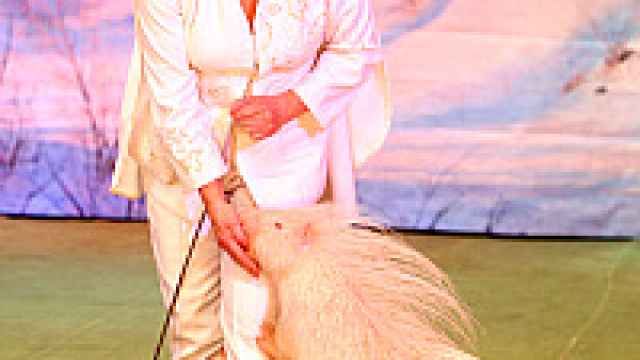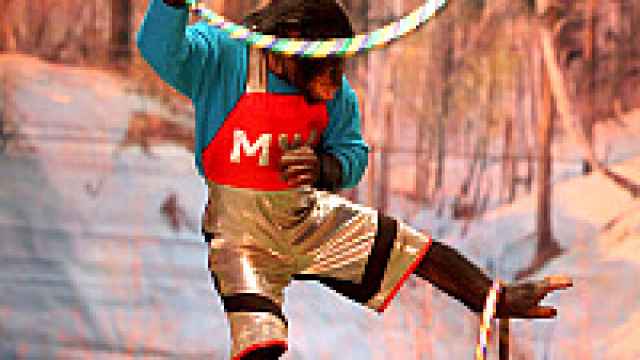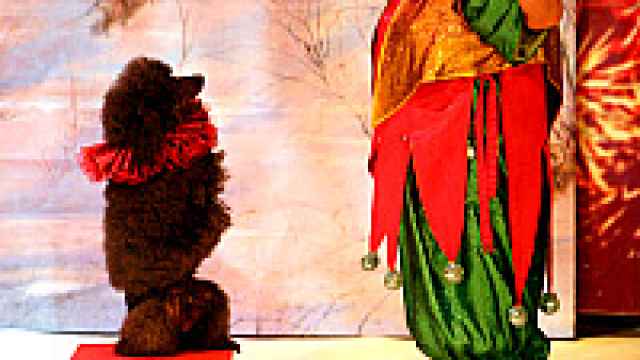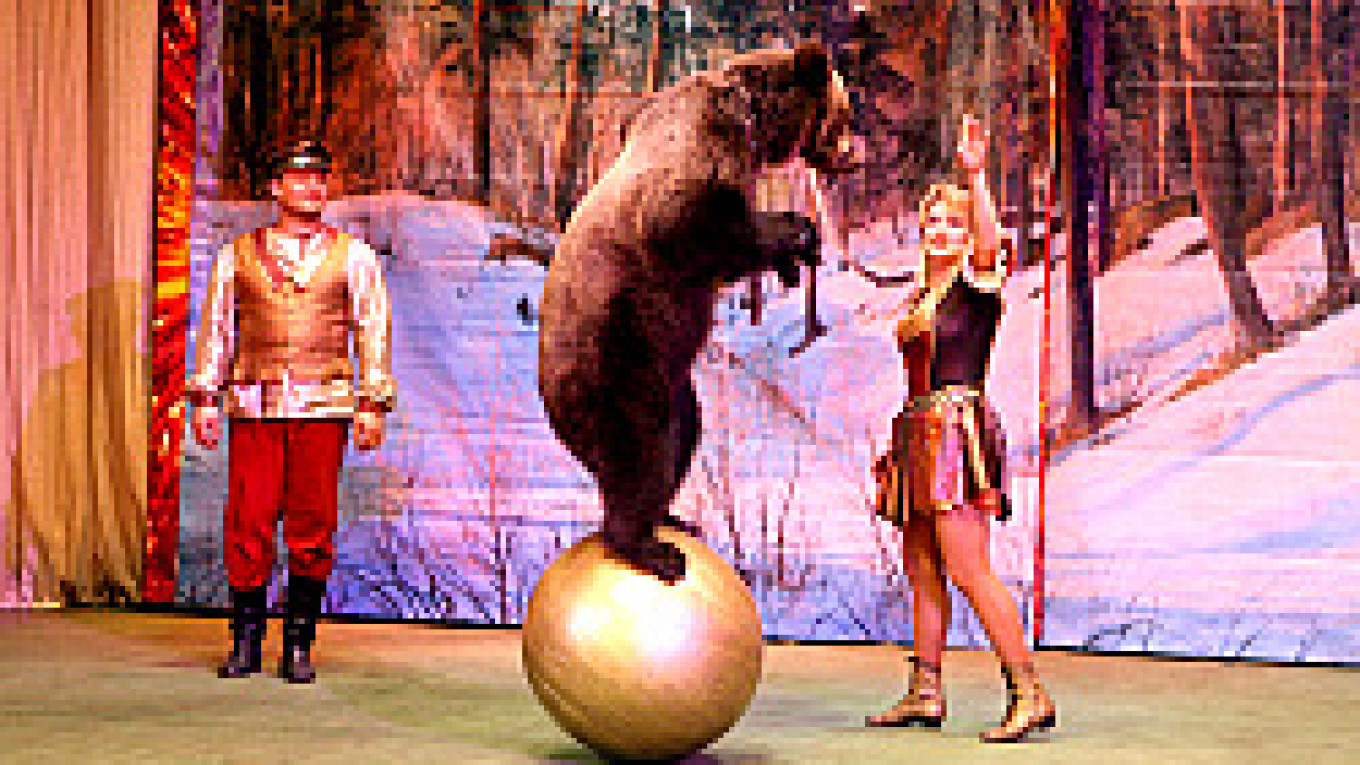The show starts, all the commotion and backstage squabbles are forgotten, and actors of all species behave as professionals, following their cues. The theme of the show is four-legged rescue rangers. First, a feline pilot in a brightly colored plane glides above the audience and down to the stage to pick up some helpers: white mice climb up a ladder to join him in the cockpit. After the plane rises back up to the ceiling, the mice say farewell to their captain and parachute down to the stage. This is just the beginning. Up next is a dancing goat, a raccoon acrobat, a chimp with a penchant for blowing soap bubbles, and a cast of cats and dogs who perform a one-act play. People, too, appear on stage, but animals are unequivocally the stars of the show.
 Grigory Tambulov / For MT Kindness toward animals is the theater's founding principle. | |
Work in the circus was not considered a proper profession for a noble, but Vladimir Durov, born in 1863, dreamed of becoming a circus performer from his early childhood. Before he founded the Durov Theater, in 1912, he had already gained considerable fame as an actor and animal trainer. One of his signature acts was performed with Zapyataika the counting dog. Durov had adopted this ruddy stray, whose act later inspired Anton Chekhov's short story "Kashtanka."
In 1912, Vladimir Durov converted a former noble's mansion into a theater he called "Kroshka" or "small thing." Durov also created a zoological lab in which he and his professional partner, Vladimir Bekhterev, studied animal behavior and developed humane training methods based solely on reward rather than punishment. At the time, this approach to training was revolutionary. Durov wanted to use the animal theater to teach children to be kind and humane. His mission has been passed down through generations of Durovs, first to his son then his granddaughter Natalya Durova. Durova was asked to help train the dog Laika, the first living being to go into space. Knowing that Laika was never meant to come back and considering this inhumane, Durova refused to take the job. Now 73, she continues to operate the theater with the motto "Teach by Entertaining."
 Grigory Tambulov / For MT A chimp on a roll and having a ball in a recent perfomance. | |
"We want kids to grow up in this theater," Durov said. "To move up from the small stage to the big stage. Now we are working to incorporate more actors into the performances on the big stage. We would like to rotate several acts so that each time a child comes to the theater he can see something new."
Animal trainer Maximova remembered her own first days at the theater.
"I came here when I was just a kid and I knew I wanted to work here," Maximova said. "I was 17 years old. I loved this theater, but because it was so prestigious I had little hope of getting a job."
She admitted that as a child she was deathly afraid of dogs and said it was ironic that the first animal she trained was a wolf.
 Grigory Tambulov / For MT Small animals star on the small stage. | |
In its lifetime, the Durov Animal Theater has witnessed a multitude of changes: new animals, news acts, new audiences, and even new forms of government. The theater survived both the Bolshevik Revolution and the collapse of the Soviet Union. Through all of these changes, the theater has remained a family business. Natalya Durova, a renowned animal trainer, actress, and author, inherited the theater after the death of her father. She is largely responsible for making the theater a popular destination in Moscow, and initiated the expansion of the theater, which in now under way. The Moscow city government sponsors the operation and the expansion of the theater.
Durova works alongside her younger brother Yury Durov, whose daughter Natasha also works at the theater part time while working toward a degree at Moscow Humanitarian University.
"I'm not sure if I'll eventually take over work at the theater," Natasha said. "When I was younger, I was against the idea because this is all I knew and I wanted to try something else. But now I don't know, something about the theater just draws you in."
****Big stage performances start at noon on Fri., and at noon, 3 p.m. and 5 p.m. on Sat. and Sun. Tickets cost 150-400 rubles. Small stage performances start at 11 p.m. on Wed. and Thu., and at 11 p.m., 2 p.m. and 4:30 p.m. on Sat. and Sun. Tickets cost 150 rubles.
4 Ul. Durova, 631-3047 M. Tsvetnoi Bulvar, www.ugolokdurova.ru ***
A Message from The Moscow Times:
Dear readers,
We are facing unprecedented challenges. Russia's Prosecutor General's Office has designated The Moscow Times as an "undesirable" organization, criminalizing our work and putting our staff at risk of prosecution. This follows our earlier unjust labeling as a "foreign agent."
These actions are direct attempts to silence independent journalism in Russia. The authorities claim our work "discredits the decisions of the Russian leadership." We see things differently: we strive to provide accurate, unbiased reporting on Russia.
We, the journalists of The Moscow Times, refuse to be silenced. But to continue our work, we need your help.
Your support, no matter how small, makes a world of difference. If you can, please support us monthly starting from just $2. It's quick to set up, and every contribution makes a significant impact.
By supporting The Moscow Times, you're defending open, independent journalism in the face of repression. Thank you for standing with us.
Remind me later.


